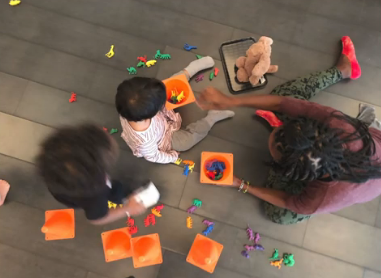One of the most important traits, we as teachers, try to instill in the children that we work with, self-confidence. However, there are many in our field who struggle to display the same self-confidence that we attempt to instill. I’ve had the pleasure to mentor so many great teachers over the years who could see the greatness in the children they cared for, but had a harder time seeing it themselves. One of my very first mentees was also one of the most compassionate, hardworking, and responsive teachers I’ve had the pleasure to work with. She also struggled to see the immense positive impact that she had on the children in her class, and, sadly, ended up leaving the field.
So many times I’ve heard teachers like her say, “I’m just an Infant Teacher,” “I’m just an assistant,” or, “I’m just a floater,” and sometimes these thoughts are backed up by the way our communities treat our early childhood professionals as “just babysitters.” Sometimes it can be hard to take credit for all the good work we do because we work collaboratively with our professional colleagues and the families we serve, but we have to remove the “just” from our vocabularies. During the COVID pandemic we’ve seen just how essential our childcare workforce is. We need to hold our heads high and KNOW how critically important we are to the children, families, and communities we serve!
- The inner confidence you have can influence the career path you take. If you see yourself as “just an assistant,” then you speak it into existence. The good news is, the opposite can be true as well. If you start thinking of yourself as the knowledgeable and professional educator you are, your climb up the career ladder will begin.
- How you say something is just as important as what you say, sometimes more. It can be hard to speak in a confident manner, or even to know what that is. Try not to end your sentence in a tone that intimates a question mark, or say, “If that makes any sense.” Sentence inflections that end in a questioning tone can be confusing to the listener about whether you are sharing information or asking a question. Try to end your sentences with a period, or even an exclamation point!
- There’s a difference between the phrases “I can’t” and “I won’t.” The former indicates the inability to complete a task due to one’s ability. The latter says that there are various other reasons, you’re too busy, it’s not a priority, or someone else can do it. This comes from an area of strength, valuing your time and standing up for yourself. Saying “I can’t” diminishes your abilities and sells yourself short.
- A surefire way to increase your confidence is to become as educated as possible. Become a more intentional self-directed learner, identify your areas of growth and passion, and develop your own plan of self-improvement with professional development. With all the distance learning that’s going on, it’s a great time to watch webinars and the vast majority are free! There’s great content coming out of NAEYC and edWeb, to just name a couple. Also, you can find great research articles to read on topics that can help to distinguish you from your peers. Join a professional organization, or sign up for their mailing list or newsletter to get the most up-to-date content. There is so much available to educators, don’t let it pass you by!
- Find a mentor who believes in your professional growth as much as you do. Another important mentor trait is someone who is strengths-based, which can help you to become more positive when looking objectively at yourself. For possible mentors, think about leaders in our field that you could turn to: child care directors/owners, professors, other teachers, trainers/coaches, etc. It’s in our DNA to want to help others and lift people up, so reach out and don’t hesitate to ask someone for guidance or even an introduction. It can be hard to connect with people in higher positions, but an introduction from a trusted colleague can help facilitate the process.
- Identify an area of growth and work on it. It’s important to be self-reflective and identify ways to be a better teacher, parent, or human. When we actively attempt to better ourselves it can do wonders for our self-esteem. Have you ever successfully started a new diet or workout regimen? Think of how great you feel when you lose those first five pounds! Working on ourselves can go a long way to self-improvement.
- Those who look to grow professionally, continually seek to gain new experiences. Step up and ask to lead a project within your classroom or your center. If someone calls in sick or is out on leave, ask to temporarily step into that role. If that’s unavailable, ask to shadow a seasoned teacher or director, someone who has a role you aspire to.
- Either start or end your day with a positive affirmation. Even on the worst of days, you can always find a ray of light. When you focus on a positive rather than a negative, you can start to feel better about yourself and your situation.
- Give yourself some grace and understanding, these are difficult times. Teachers make hundreds of micro-decisions throughout the day using our knowledge and expertise, so take it easy on yourself if you get a couple of those wrong.
As we continue to grow and improve our field, we make strides toward professionalizing it. An important part of this process is for those currently working in the field, every one of them, at every level, to understand their own importance, as well as where they belong in the greater early childhood community.
Gerald Smith is an Institute Career Development Coordinator in Buffalo and is an early childhood professional with 16 years of experience as a preschool teacher, child care center director, quality improvement coach, and professional development trainer.




Gerald,
Your thoughts and positive suggestions for empowering those who work in early childhood education are much appreciated and valued by me.
Your post is most timely and provides hope and a positive path forward for all of us.
Today I received an NAEYC publication, “Trauma & Young Children – Teaching Strategies to Support & Empower”, included is an extensive chapter entitled, “Caring for Yourself” which affirms and echoes many of the points you make in your post.
Warmly,
Steve